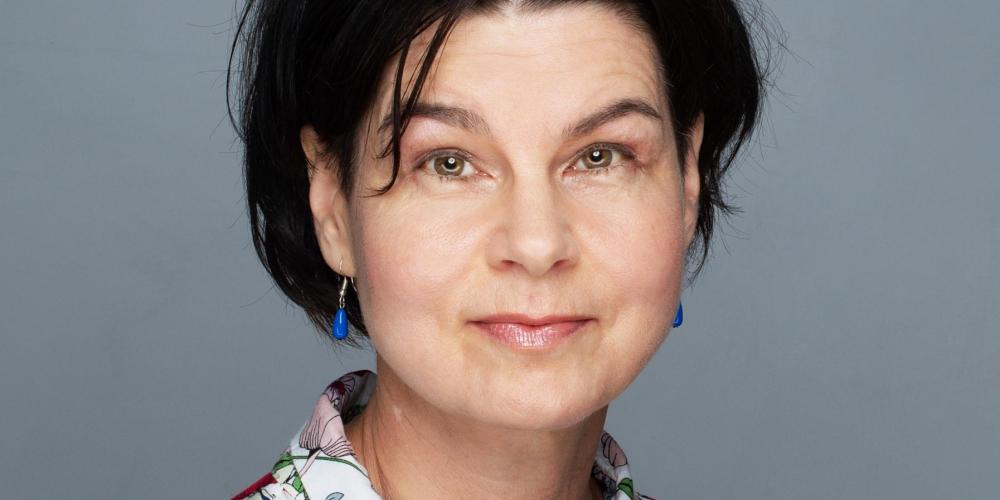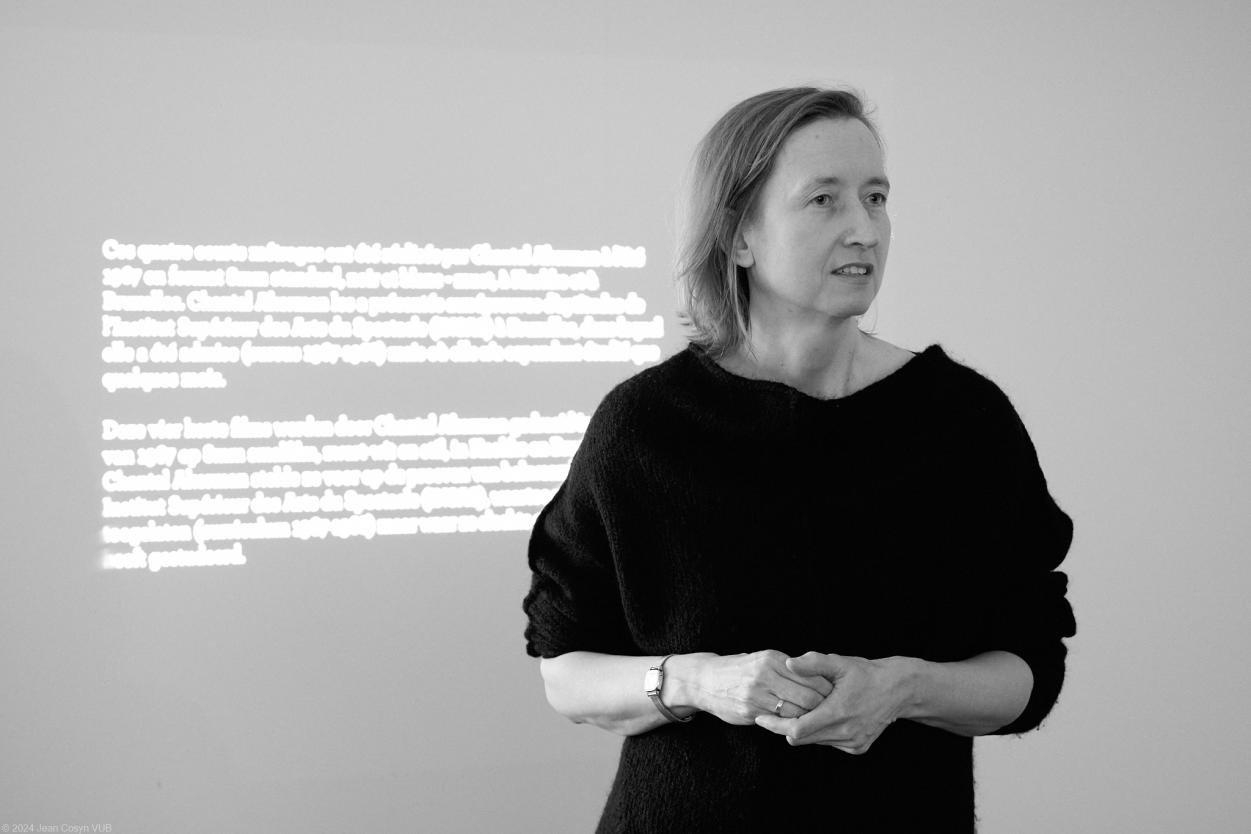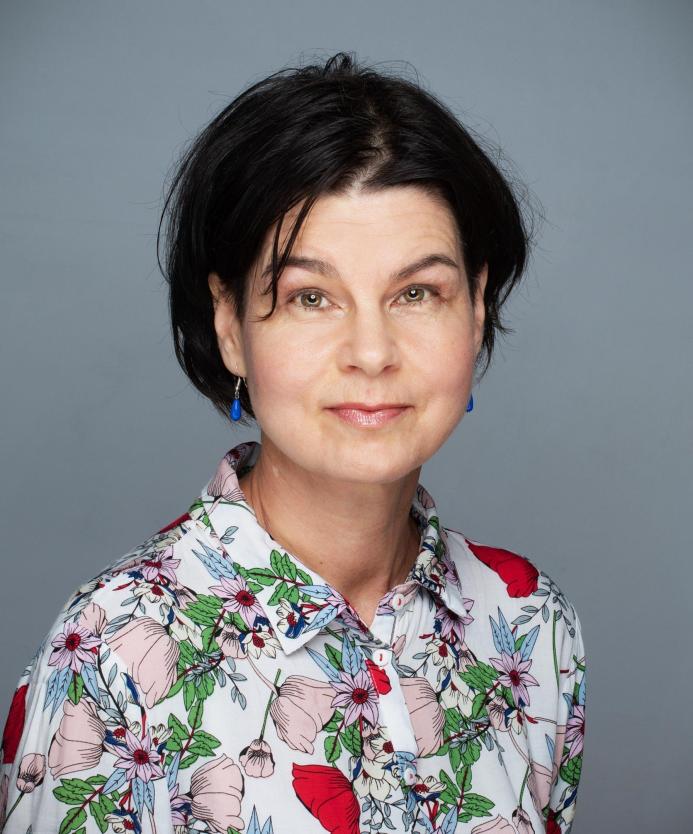
The Faculty of Arts and Philosophy at VUB launched a new lecture series called Ties that Bind Us. The series focuses on the increasing polarisation in our society and aims to inspire a more open view of community. Professors Eva Ulrike Pirker (English Literature), Katarzyna Ruchel-Stockmans (Art History) and Benoît Henriet (History) are the initiators of the series. They explain why it is more necessary than ever.
Inaugural lecture by renowned philosopher Prof Dr Kwame Anthony Appiah
On Monday 24 June 2024, professor Kwame Anthony Appiah, renowned philosopher and New York Times columnist, kicked off the new lecture series. Appiah refutes 'Western' notions of difference and 'moral superiority' with a concept in which he sees culture as non-exclusive and a participatory and sociable process. AT VUB, he gave a unique lecture called 'Speaking of Identity' in which he questioned the extent to which identities contribute to global conflicts and how they fuel the us-versus-them mentality. This is also the central theme of the series.
What was the motivation for launching this series?
Eva Ulrike Pirker: “The series was born out of the observation that our world appears to be deeply, and increasingly, divided. We are not the only ones to notice this; when it comes to politics, for example, one is pressured to choose a side, even in conflicts that are highly complex. People seem to forget that there are grey zones, a great variety of experiences and in most cases more than two opposing positions. In our series, we want to return to these grey areas and highlight the value of embracing the complexity of human experiences. There will be two or three lectures each academic year, not only from academics but also from artists, writers, etc., with the common thread being ‘What connects us, as individuals, to others? Knowing that the ties that bind us to others also define us to some extent, for better or worse.’”

“Diversity is not the problem. On the contrary, we need more of it, not less”
Katarzyna Ruchel-Stockmans: “Increasingly, we seem convinced that our identities are at odds with each other, with no common ground. We want to ask again: to what extent are they negotiable? People like to feel connected to a social group with which they can identify. However, that identity is often imposed from outside and sometimes even seen as pejorative. This leads to greater differences between people, especially those who do not speak the same language and thus find it harder to communicate. At the same time, we are convinced that these social forms are constantly changing and negotiable. We want to actively play a role in this. With our speakers, students and guests, we aim to create a common ground to bridge differences and show that diversity is actually the strength of a society. The public debate on this topic is rarely constructive, so we hope that our lecture series at the VUB in multicultural Brussels can make a positive contribution. We cannot change the world, but we can make a difference.”
The VUB calls for a better world in its The World Needs You campaign, but for this series, you’ve turned that slogan into “VUB needs the world”. What was behind this change?
Eva Ulrike Pirker: “The VUB wants to be an international, multicultural university, and to be clear: it already is. Look at its lecturers and students, who come from all over the world. At the same time, this diversity is also a challenge. Every individual has personal baggage, usually has two parents, who in turn were shaped by culture, religion, language, race, you name it. 20 years ago, diversity was not as controversially discussed as it is today. Both diversity and an open society were taken for granted. Today, it feels as though we are awakening from a neoliberal dream and realising that the dream of individualism is exclusive and does not correspond with reality, according to the lived experiences of many people. Importantly, diversity is not the problem; on the contrary, we need more of it, not less. Hence: the VUB needs the world.”
Do students also believe this?
Katarzyna Ruchel-Stockmans: “Oh yes. This is very evident from our surveys. More and more students indicate that they do not feel connected, that they struggle to integrate with the campus and the university. Our digital society likely plays a role in this. Additionally, more students have less time to study due to work commitments. This makes them more likely to choose digital alternatives and be less present on campus, creating a vicious circle. However, we are convinced that they will embrace the Ties that Bind Us series. We must not forget that we are all social beings. We need to find a way to speak with each other again and embrace differences. And yes, that requires continuous work and perseverance.”
Eva Ulrike Pirker: “I certainly notice a great desire among students to understand the world and their place in it.”
“Literature and art help you step out of your bubble and learn about a world that is not your own”
Polarisation is increasing, as shown by the recent election campaigns and results. An open society still seems like an illusion. What stands in our way?
Eva Ulrike Pirker: “We still live very much in line with the meritocratic myth according to which everyone is responsible for their own happiness, but which makes many people fundamentally unhappy. It implies a competitive world in which only a handful of people succeed. The media and social media also play a significant role in maintaining the myth, they provide the supposed criteria needed to belong to the happy few: this is what you must do, this is how you must be. However, there is a large discrepancy between the reality of people’s lived experience and what is presented to us as desirable.”
Katarzyna Ruchel-Stockmans: “Indeed, we often feel the pressure to prove ourselves and distinguish ourselves at the expense of others. Paradoxically, this means we almost always have to choose a side to belong to a specific group and sound ‘stronger’. However, these are usually superficial constructions, where the whole package – What does the group stand for? How does it communicate? – is perhaps adopted too quickly. I hope our series can make a difference here. To enable dialogue again, without imposing a pre-determined identity on anyone.”

How can the humanities contribute to this? How can literature, history or art history connect people, knowing that people are reading less and not always well-informed about history?
Eva Ulrike Pirker: “Literature and art help you step out of your bubble and learn about a world that is not your own. Maybe you identify with another character living a very different life, yet it helps you cross a bridge. Every time I take students to see works of abstract art, for example, I notice how valuable it is that they literally have to use their imagination to appreciate what these works do. We may not ‘understand’ a work fully, but we can still engage with it, relate to it. And you know, I grew up in a country where books were once burned, where art was labelled ‘degenerate’. The censorship and intimidation of writers and artists, even today, show that literature and art are not seen as a decorative extra but taken very seriously when it comes to questions of power.”
Katarzyna Ruchel-Stockmans: “Absolutely. A month ago, I took my students to see an Australian play featuring people with disabilities. Afterward, everyone was speechless. These experiences create an extra connection, sometimes with a delay if, like us, you are too overwhelmed. Literature, art and artistic research – often underestimated – can help make your own world bigger and help you think outside the box. That’s why we want to make our Ties That Bind Us series absolutely interdisciplinary. Of course, disciplines, and their specific jargon, make the operations of a university easier, but if we are honest, this is not a reflection of society. The only way to address today’s complex issues is to work together, across disciplines.”
Eva Ulrike Pirker: “Regarding ‘less reading’: we live in a world that is changing rapidly, where literary and artistic forms of expression are also changing. Many artists and creatives today work with new digital media. The emergent practices may well challenge traditional concepts of ‘reading’.”
Katarzyna Ruchel-Stockmans: “Today, there is so much digital information available to learn about the world. Young people may read fewer books, but they do listen to informative podcasts and audiobooks. In Greek times, poetry was recited, so in that sense, everything comes back. Let’s not be techno-pessimistic; new media offer many opportunities for the new generation.”
“Professor Appiah embodies the quintessential creative and free thinker, not least because he has the skill to explain complex material very clearly”
Professor Appiah kicked off the series. Why did you choose him? And who else is on the programme?
Eva Ulrike Pirker: “Professor Appiah has a great capacity to connect thinkers across disciplines. He has a column in the New York Times called The Ethicist, where people can ask questions about everyday ethical issues. At the same time, he is also a philosopher and integrates his personal biography – his mother was British, his father Ghanaian – into his work. He embodies the quintessential creative and free thinker and is, in that respect, our ideal first guest speaker, not least because he has the skill to explain complex material very clearly. In the autumn, we welcome Esther Dischereit, an award-winning German-Jewish author and poet whose mother and family survived the Holocaust. She documents, writes and speaks about the violence of what we call ‘othering’ in English, the reduction of others to certain identity characteristics. She writes about what it means to grow up in a family with a complex history and in a society with contradictions. This is actually an experience that many people know.”
Finally, when will you consider the lecture series a success?
Eva Ulrike Pirker: “I would be very happy if we could reach not only VUB students and academics but also people from outside the campus.”
Katarzyna Ruchel-Stockmans: “Sometimes I hear from my students weeks after a seminar or activity about how it influenced them. It would be nice if our lectures could have such a longterm impact.”
Bio Eva Ulrike Pirker
Eva Ulrike Pirker has joined the VUB as a research professor of English and Comparative Literature in 2023. She previously taught at the University of Düsseldorf (2017-2023) and the University of Freiburg (2003-2016), where she completed her PhD in English Philology after studying new English literatures, American studies and philosophy in Tübingen and San Diego. Her special interest lies in researching transcultural processes in and through literature and other art forms.
Bio Katarzyna Ruchel-Stockmans
Katarzyna Ruchel-Stockmans teaches courses on contemporary art, photography and new media at VUB. She studied art history and philosophy in Krakow and cultural studies in Leuven. Her PhD research at KU Leuven focused on representations of the past in contemporary art. Currently, her research focuses on lens-based media and documentary practices, with specific attention to community archives of vernacular photography and contemporary participatory art.
The world needs you
This initiative is part of VUB's public programme, a programme for everyone who believes that scientific knowledge, critical thinking and dialogue are an important first step to create impact in the world.
As an Urban Engaged University, VUB aims to be a driver of change in the world. With our academic edcuational programmes and innovative research, we contribute to the Sustainable Development Goals of the United Nations and to making a difference locally and globally.